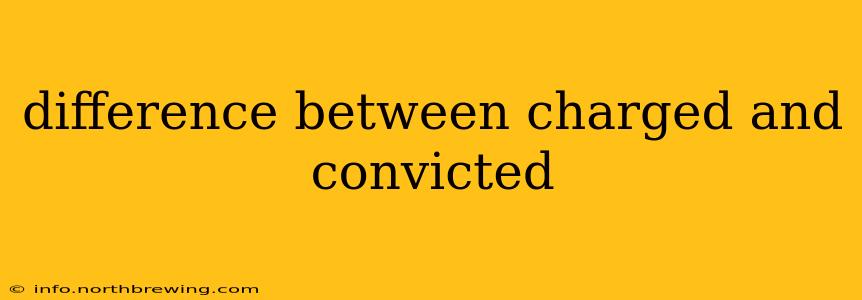The terms "charged" and "convicted" are often used interchangeably, leading to confusion about the legal process. However, they represent distinct stages in the journey of a criminal case, signifying vastly different legal statuses. Understanding this difference is crucial for anyone following legal news or involved in a legal situation.
What Does it Mean to be Charged?
Being charged with a crime means that law enforcement or a prosecutor has formally accused an individual of committing a specific offense. This accusation is typically documented in a formal legal document called an indictment or a complaint. A charge is an allegation, not a determination of guilt. The accused is presumed innocent until proven guilty in a court of law. At this stage, the individual has not yet had their day in court to defend themselves against the accusations.
Think of it as the starting gun in a race. The charge initiates the legal proceedings, but the race to a verdict is far from over.
What Happens After Being Charged?
After being charged, several things can occur:
- Arraignment: The accused appears before a judge, where they are informed of the charges against them and enter a plea (guilty, not guilty, or no contest).
- Bail or Detention: The judge may set bail, allowing the accused to be released pending trial, or they may be held in detention.
- Discovery: Both the prosecution and the defense gather evidence and information related to the case.
- Plea Bargaining: Negotiations may occur between the prosecution and the defense, potentially leading to a plea agreement where the accused pleads guilty in exchange for a reduced sentence or other concessions.
- Trial: If a plea agreement isn't reached, the case proceeds to trial, where a judge or jury will hear evidence and determine guilt or innocence.
What Does it Mean to be Convicted?
Being convicted means that a court of law has found an individual guilty of the crime(s) they were charged with. This determination comes after a trial (or a guilty plea) and represents a final judgment of guilt. A conviction carries significant legal consequences, including potential imprisonment, fines, probation, and a criminal record.
This is the finish line of the legal race. The conviction signifies the end of the trial and the legal determination of guilt.
The Weight of a Conviction
A conviction is a serious matter with lasting implications. It impacts employment opportunities, housing options, and even the ability to travel to certain countries. The severity of the consequences varies depending on the nature and gravity of the crime.
What's the Difference in a Nutshell?
The core difference lies in the legal status:
- Charged: Accused of a crime; presumed innocent until proven guilty.
- Convicted: Found guilty of a crime by a court of law; the legal process has determined guilt.
Frequently Asked Questions (PAAs)
Q: Can someone be charged with a crime but not convicted?
A: Absolutely. Many cases are dismissed, acquitted (found not guilty at trial), or result in plea bargains that don't involve a conviction on the original charges. The mere act of being charged doesn't automatically equate to guilt.
Q: What happens if someone is found not guilty?
A: If someone is found not guilty (acquitted) after a trial, they are released from all charges related to that case. The presumption of innocence prevails, and they are considered legally free from any wrongdoing related to the specific charges.
Q: Can a person be convicted of a lesser charge than what they were originally charged with?
A: Yes, this often happens through plea bargains. The accused might plead guilty to a less serious charge in exchange for a more lenient sentence, avoiding the risks and costs of a trial. This does still result in a criminal conviction, although for a different crime than the initial charge.
Q: Is there a difference between being charged and arrested?
A: While often occurring in close proximity, arrest and being charged are distinct. Arrest is the physical apprehension of an individual, while being charged is the formal accusation of a crime. An individual can be arrested without being immediately charged, and sometimes charges are filed after an arrest, pending investigation.
In conclusion, understanding the distinction between being charged and convicted is vital for navigating the complexities of the legal system. These are two entirely separate stages of the process, and it’s crucial to remember the presumption of innocence until a conviction is reached.
